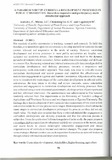| dc.contributor.author | Lopokoiyit, M. | |
| dc.contributor.author | Chemining'wa, G.N | |
| dc.contributor.author | Maina, J.G | |
| dc.contributor.author | Ambuko, J. | |
| dc.date.accessioned | 2014-07-22T06:12:35Z | |
| dc.date.available | 2014-07-22T06:12:35Z | |
| dc.date.issued | 2011-09 | |
| dc.identifier.citation | Optimimization of Agricultural Value Chains for sustainable Development | en_US |
| dc.identifier.uri | http://hdl.handle.net/11295/73218 | |
| dc.description | aGRO 2011 biennial conference presentation | en_US |
| dc.description.abstract | The mandate of public universities is teaching, research and outreach. To fulfil this
mandate, it is incumbent upon the universities to develop and deliver curricula that are
current, relevant and responsive to the needs of society. However curriculum
development and review processes in most public universities are lengthy, noninclusive and academia driven. This situation does not lend itself to the dynamic
agricultural industry where consumer, farmer and technical knowledge and skills are
in constant flux. Increasing external and internal pressures calls for a paradigm shift in
curriculum development and delivery processes, towards a responsive and
participatory multi-stakeholder approach. This study was done to critically review
curriculum development and review process and establish the effectiveness of
stakeholder engagement in Egerton and Nairobi Universities. Objectives of the study
were to document the main stages of the curriculum development in selected public
universities, the time taken to develop and review curricula, assess stakeholder
selection and engagement in curriculum development and delivery processes. Data
was collected using a semi structured questionnaire, desktop review of past reports and and key informant interviews. The questionnaire was administered to five lecturers
randomly selected from five departments at the University of Nairobi's college of
Agriculture and Veterinary Sciences and two departments at Egerton University. The
findings show that development of new curricula takes a minimum of two years in both
universities while the review process takes longer. Most respondents observed that the
many stages in curriculum development prolonged the process yet they did not add
much value. The study also revealed that there is minimal stakeholder engagement in
curriculum development and delivery processes and that the selection process is
subjective. From the synthesis of information gathered in the study, the paper proposes
a paradigm shift in curriculum development and delivery processes at the macro, meso
and micro levels to ensure meaningful stakeholder engagement and ensure
responsiveness of curricula to internal and external changes. The paper also proposes
some strategies that universities can use to reposition themselves as network brokers in the agricultural information and innovation systems. | en_US |
| dc.description.sponsorship | National Council of Science and Technology, The Kenya Seed Company | en_US |
| dc.language.iso | en | en_US |
| dc.publisher | Faculty of Agriculture, University of Nairobi | en_US |
| dc.subject | agriculture | en_US |
| dc.subject | higher learning, | en_US |
| dc.subject | stakeholders, | en_US |
| dc.subject | Curriculum development, | en_US |
| dc.title | A paradigm shift in curricula development processes in public universities: Towards a responsive and participatory multistakeholder approach | en_US |
| dc.type | Presentation | en_US |
| dc.type.material | en | en_US |

